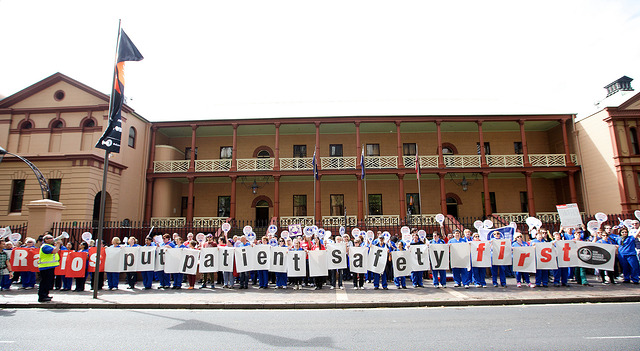News
Congress Could Learn from Global Nursing Unions

In this month’s issue of AJN, we report on the formation of a new international organization of nurses and health care workers in June—Global Nurses United (GNU). Under the auspices of the California-based National Nurses United, unions from 14 countries agreed to work together to “stop the harmful effects of austerity measures, privatization, and cuts in health care services.” The organization also is actively involved in advocating for other issues supported by labor unions, such as a tax on certain financial firms (called the Robin Hood tax) that would raise revenues to help provide needed services. Saving jobs and making workplaces safer unite all unions.
On September 17, the group held an international day of action. Member unions in Africa, Asia, Australia, and Europe held marches to protest cuts in health services and advocate for better working conditions for nurses, better staffing ratios and the Robin Hood tax. Unions in some countries had additional agendas—in South Korea, it was to save the Jin Ju Medical Center; in Australia, mandatory minimum nurse–patient ratios was a demand; in Costa Rica, the member union called for nurses’ right to participate in collective bargaining.
Will these marches and protests yield any results? Will policy makers take note at the discontent of so many people or will they just nod and carry on, business as usual?
For those of us in the United States, business as usual is no business, as the government continues in shutdown mode. According to a story reported this weekend, the current stance of some Congress members to use federal budget regulations to withhold funding for the health care law was actually a strategy planned not long after President Obama’s reelection.
I marvel at how quickly the GNU coordinated so many groups—and across borders—to come together around a basic set of priorities for all their constituents, despite some regional and local differences. The contrast with the divisive approach of some factions in the U.S. Congress could not be more stark.
http://journals.lww.com/ajnonline/Fulltext/2013/10000/New_Worldwide_Nursing_Group.11.aspx
----------------------------
New Worldwide Nursing Group
Potera, Carol
Global Nurses United launched in June by National Nurses United.
An international group of nurses met in San Francisco on June 22 to form Global Nurses United (GNU). The formation of the nursing group was spearheaded by members of National Nurses United (NNU), which is based in Oakland, California, and represents 185,000 RNs in the United States.
Leaders of the Global Nurses United
Nurses worldwide are seeing the often profound public health consequences of unemployment, unrelenting policies of austerity, poverty, and price gouging—and leaders who put profits ahead of access to basic health care services. Some countries with public health care systems are cutting services to save money.
GNU, an affiliate of NNU, is “the first international structure that deals with direct-care nursing issues. We address the obstacles that nurses face in caring for patients on a daily basis,” says Deborah Burger, president of NNU. Because nurses work with patients one-on-one, they get an intimate view of patients’ distress, in both wealthy and poor nations. GNU believes that universal health care should be a human right. The organization aims to promote reliable patient care with adequate nurse-to-patient ratios and safe workplaces. “We want to promote healthy systems that provide more care for less money,” says Burger.
GNU supports a financial transaction tax on stock market trades, which 40 other countries use to help fund health care. The United States had a similar tax until 1966. NNU members joined Representative Keith Ellison (D-MN) when he reintroduced the Inclusive Prosperity Act (HR 1579) on April 17. The bill proposes a 0.5% tax on each $100 stock trade. “It could raise $350 billion a year to improve health care and education,” says Burger. The tax would apply only to Wall Street firms and high-volume stock trades.
Other projects of GNU focus on stopping the “poaching” of nurses from foreign countries. The United States, for example, doesn't invest enough in training nursing students, according to Burger. Instead, hospitals import nurses trained in the Philippines and Caribbean countries, sometimes drawing an entire class of graduates away from their homeland. This creates shortages of nurses in those countries.
Nurses from Argentina, Australia, Brazil, Canada, Costa Rica, the Dominican Republic, Guatemala, Honduras, Ireland, Israel, the Philippines, South Africa, South Korea, and the United States participated in the initial meeting of GNU.—Carol Potera
© 2013 Lippincott Williams & Wilkins. All rights reserved.